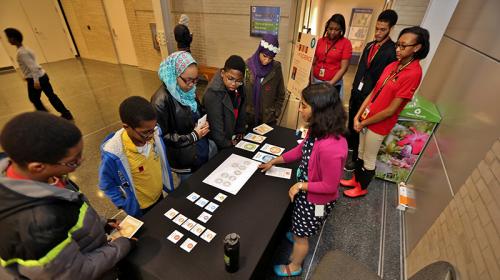Alumni Spotlight: Jayatri Das
In this edition of BMB’s Alumni Spotlight, we feature Jayatri Das, Ph.D.

Jayatri is the Chief Bioscientist and Director of Science Content at The Franklin Institute in Philadelphia, Pennsylvania. A 1999 alumnus of Penn State, she graduated with undergraduate degrees in both Biochemistry and Molecular Biology as well as Biology. Deciding to continue her education, Jayatri earned her Ph.D. in ecology and evolutionary biology from Princeton University.
After earning her Ph.D., Jayatri held a Science and Technology Policy Fellowship at the Marian Koshland Science Museum of the National Academy of Sciences in Washington, DC. She then conducted her postdoctoral research in biology at the University of Pennsylvania, investigating the biochemical processes that allow living things to adapt to different environments
In 2016, Jayatri was honored with the American Alliance of Museums’ Nancy Hanks Award for Professional Excellence. She is an invited Fellow of the Center for Neuroscience & Society at the University of Pennsylvania.
Since joining The Franklin Institute Jayatri has led exhibit development of both “Your Brain”, a national award-winning exhibit about the neuroscience and psychology of the human brain, and SportsZone. She also leads the Institute’s programming initiatives regarding materials science, nanotechnology, synthetic biology and other areas of emerging science and their impact on our everyday lives.
As a scientist, Jayatri works to understand how our brains work, how our neighborhoods affect our health, and how new technologies change our future. In addition to being an acclaimed scientist and science communicator, Jayatri is also a mother of 10-year-old twins.
You can learn more about Jayatri by watching her story and can follow her on Twitter and LinkedIn.
Let’s chat with Jayatri, talk about her experiences while at Penn State, and catch up with what she’s been up to.
What is it that you do at the Franklin Institute?
Our team of scientists helps people explore, ask questions, and participate in decisions about how science and technology are relevant to and important for our lives. I work on a variety of projects, including museum exhibits, public programs, community partnerships, and digital media; across these platforms I aim to engage audiences with science in creative and effective ways. I also work with other scientists to help them become better communicators and listeners, in order to broaden the perspectives that shape science and make it more accessible.

What was it that made you want to come to Penn State, and BMB, to pursue your education?
I had gotten very interested in genetics as I was finishing high school, and I was excited to come to Penn State to learn more about a field that was new to me. My older sister was already a student at University Park, and I was fortunate to be awarded a Braddock Scholarship to attend the Eberly College of Science. While my sister's experience was a window into the great opportunities that Penn State could provide, I also knew that being at such a big school meant I didn't have to live in her shadow!

How do you feel Penn State, and BMB, prepared you for your current position or career?
At Penn State I took classes ranging from cell biology and immunology to field ecology and human geography. The depth and breadth of science I was able to explore led me to discover evolutionary biology as my passion -- I wanted to understand the small forces that shaped the world around me. In addition to that academic foundation, however, I found many opportunities outside of my classes that developed my leadership skills, from teaching to clubs to organizing public events. These experiences were critical for broadening my horizons about what I could do with a degree in science. Today, I get to share these passions to ask "how?," "why?," and "so what?" with curious people of all ages.
Did you conduct research while at Penn State? Where was your research conducted and what was its focus?
I conducted research for three years with Claire Thomas in the departments of biology and BMB. I loved doing experimental science, but my project ran into many roadblocks. Claire nurtured my independence as a scientist by encouraging me to try different solutions and supporting me when things failed. I still try to channel her perspective in mentoring my younger colleagues.
Share at least one interesting/fun fact about yourself.
A more out-of-the-ordinary fun fact is that I’ve had the opportunity to do science in microgravity!

What do you like to do when you’re not at work?
I started sewing when my kids were young as a way to make better fitting, more unique clothes for them, and now sew many of my own clothes as well. I've also dedicated my time to increasing community engagement with local government and services, and I'm currently running for judge of elections in my town.
Favorite “We Are Penn State” Moment.
I talk to many middle and high school students about career opportunities, and when I first introduce myself as a scientist with a PhD, I often sense that kids feel somewhat intimidated. But invariably, they all loosen up when they ask where I went to college and I say, "Penn State!" Whether it's our large and loyal alumni network, our sports teams, or the community partnerships at different campuses, so many kids feel like they already have a connection to Penn State. That connection makes them feel like the first step to a career in STEM is something that's within their grasp.
Advice from Jayatri to future generations of scientists:
Figure out where you can solve the problems you want to solve. Research in education shows that kids (and especially girls) are motivated to apply STEM to issues that they care about, and for me that's as true at age 42 as it was at 14. There are so many diverse careers in STEM -- take advantage of opportunities to explore new challenges that help you find what matters to you and where you can make a difference.